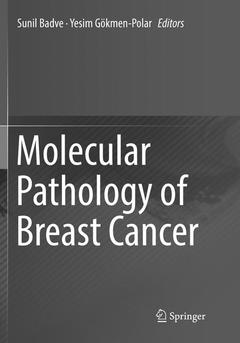Molecular Pathology of Breast Cancer, Softcover reprint of the original 1st ed. 2016
Coordonnateurs : Badve Sunil, Gökmen-Polar Yesim

The complex landscape of breast cancer requires distinct strategies for the management of various molecular subtypes of this disease. Rapid advances in the field of molecular biology have been bewildering for those involved in its study and management. ?Molecular Pathology of Breast Cancer? aims to close this knowledge gap by discussing comprehensively the evolution, biological basis and clinical applications with a focus on the ?what, when, and how? of the most significant molecular markers known to date. These markers are evaluated in the context of genomic, transcriptomic and proteomic profiles, which is integral to the practice of precision medicine.
The application of next generation sequencing (NGS) has provided new insights in the regulation of genomic and transcriptomic structure and function. Alterations in DNA such as mutations and single nucleotide polymorphisms (SNPs) have been correlated with outcomes and provide for novel therapeutic approaches. These NGS analyses have also revealed the extensive contributions of epigenetic mechanisms such as histone modifications, non-coding RNA and alternative splicing. All of these changes together contribute to alterations in proteome. Newer assays that allow greater stability and analytical consistency are emerging. These alterations in tumor profiles can be also now detected by imaging techniques.
The heterogeneity of both tumor and tumor microenvironment, an inevitable reality, is discussed in detail with particular focus on cancer stem cells and immune signaling. A chapter is dedicated to the emerging technology of ?liquid biopsy?, which opens a novel approach for ?continuous? monitoring of cancer that might be superior to conventional diagnostics,
?Molecular Pathology of Breast Cancer? provides a quick and easy, not to mention essential, tour for clinicians, pathologists and scientists who are seeking to understand the integration of molecular biology into the diagnosis, prognosis and management of breast cancer.
Preface
1) Translating markers in clinical practice (Lisa McShane)
2) Pre-analytical Variables, Tissue Quality and Clinical Samples from Breast Cancer Patients (David Hicks)
3) Impact of Analytical Variables in Breast Cancer Biomarkers Analysis (Anthony Watford/ Bharat Jasani)
4) Hormone Receptors in Breast Cnacer (Suijkerbuijk/van Diest).
5) Human Epidermal Growth Factor Receptor 2 (HER2) (Santa-Maria/Jain/Gradishar)
6) Triple Negative Breast Cancer (Melinda Telli)
7) Proliferation Markers in Breast Cancer (Frederique Penault-Llorca/Radosevic-Robin).
8) Novel IHC Based Biomarkers in Breast Cancer (Emad Rakha/Ian Ellis).
9) Tumor Heterogeneity in Breast Cancer (Sunil Badve)
10) Breast Cancer Stem Cells (Choi/Rosato/Chang)
11) The Tumor Microenvironmen t as a Metastasis Biomarker in Breast Cancer (Sparano/Jones/Rohan/Harney/Condeelis/Oktay)12) Tumor Infiltrating Lymphocytes as a prognostic and predictive biomarker in breast cancer (Janakiram/Khan/Fineberg/Zang/Sparano)
13) Novel Imaging Based Biomarkers in Breast Cancer (Edmonds/Mankoff)
14) Circulating Tumor Markers for Breast Cancer Managgement (Prabhakar/Harris)
15) Circulating Tumor Cells (Banys-Paluchowski/Schneck/Krawxzyk/Fehm)
16) Circulating Nucleic acids (RNA/DNA)in Breast Cancer (Gingras/Sanarpia/Ignatiadis)
17) Prognostic Factors for Ductal Carcinoma in Situ of the Breast (Solin)
18) Prognostic and Predictive Gene Expression Signatures in Breast Cancer (Buechler)
19) Genomic Markers ER-negative Breast Cancer (Karn/Hatzis)20) Next-Generation Seguencing Basxed Testing for Breast Cancer (Ganesan/Hirshfield)
21) Epigenetic Mechanism in Breast Cancer (Verma/Badve)
22) Nocoding RNAs in Breast Cancer (Gökmen-Polar/Badve)23) Alternative Splicing in Breast Cancer (Gökmen-Polar)
24) Pharmagocenomics of Breast Cancer (Abramovitz)
25) Applied Proteomics in Breast Cancer (Lai/Badve)
26) Biomarkers in the Clinic (Mina/Sledge)
Index.
Bio Data: Prof. Sunil Badve. MBBS, MD. FRCPath.
Sunil Badve is Professor in departments of Pathology and Laboratory Medicine, and Internal Medicine and the Director of Translational Genomics Core at the Indiana University Simon Cancer Center.
He received his medical degree and pathology residency at Grant Medical College and Tata Memorial Hospital for cancer. He did further training at the St George’s Medical School and at Royal Marsden Hospital, England. In USA, he trained at the Albert Einstein School of Medicine (NY) and at Yale. He served on the faculty of Northwestern University prior to joining Indiana University.
Dr. Badve’s main research and clinical expertise is in breast cancer. He is the breast Pathologist for ECOG group and serves on the Breast Cancer Steering Committee. He has been a PI and co-investigator on several NIH (R01; R21), DOD and foundation grants. He is recognized as a Komen Scholar by the Susan G Komen for the Cure. He has over publication of over 170 peer-reviewed scientific articles in addition to invited reviews and book chapters including WHO Classifications of Breast and Thymic tumors. He has several patents and has developed and commercialized a gene signature for the prognostication of thymic cancers.
He serves as the associate editor of Clinical Breast Cancer and on the editorial board of six additional journals (Modern Pathology, Analytical and Cellular Pathology, Pathology, BMC Cancer, Journal of Cancer, and Journal of Molecular Biomarkers and Diagnosis). Dr. Badve is a regular speaker at national and international pathology meetings and has conducted short courses on breast pathology for the CAP and USCAP. He has served ASCO-CAP Guidelines Committee for hormone receptor assessment in breast cancer and has been a faculty presenter at the ASCO annual meeting.
Bio Data: Assistant Prof. Yesim Gökmen-Polar, Ph.D
Dr. Yesim Gökmen
Desktop ready reckoner to one and all interested in breast cancer
An overview detailing the most recent advances in the molecular pathology of breast cancer to satisfy the requirements of a diverse group of audience
Provides rationale underlying the role of molecular markers to enable development of a holistic approach to breast cancer research and treatment
Includes supplementary material: sn.pub/extras
Date de parution : 07-2018
Ouvrage de 428 p.
17.8x25.4 cm
Date de parution : 12-2016
Ouvrage de 428 p.
17.8x25.4 cm
Thème de Molecular Pathology of Breast Cancer :
Mots-clés :
Breast Cancer; Molecular markers; Biomarkers; Pathobiology; Precision medicine



